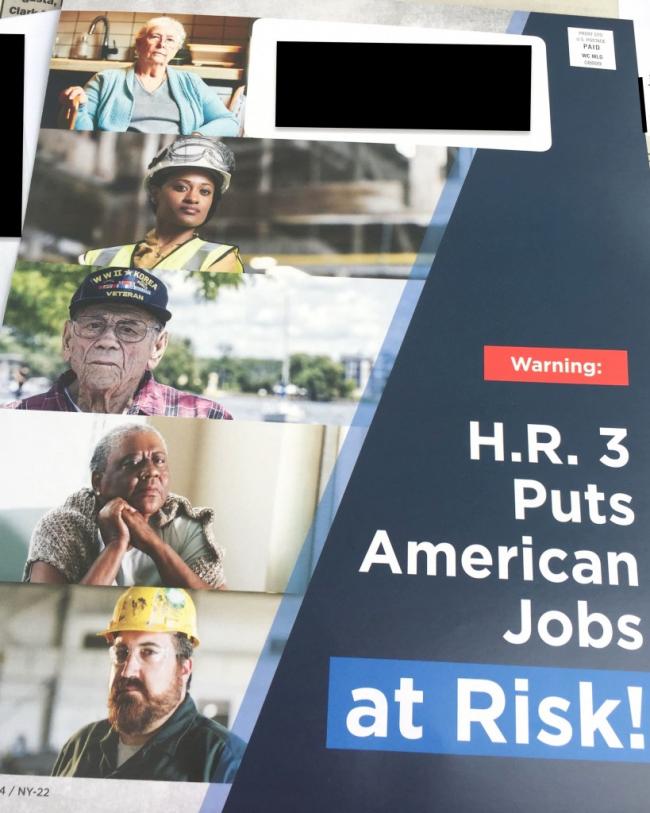Articles Menu

TRADE UNIONS ARE joining the pharmaceutical industry to attack Democrats over their long-anticipated legislation to lower prescription drug prices. The Pharmaceutical Industry Labor-Management Association, or PILMA, a coalition between the biggest pharmaceutical companies in the nation and union construction workers, recently sent out mailers using industry talking points to slam House Speaker Nancy Pelosi’s signature drug-pricing plan.
The mailer — which warns that the bill would “eliminate millions of American jobs” and have a “devastating impact on the economy” — is also at odds with broad union support for the Lower Drug Costs Now Act.
The PILMA mailer, which was obtained by The Intercept, was distributed in New York’s 22nd Congressional District and urged constituents to call Rep. Anthony Brindisi and tell him to “put a stop” to the drug-pricing bill. Brindisi, who narrowly won a seat in 2018 previously held by a Republican, often cites high prescription drug prices as a top concern in his district. It’s likely that versions of the mailer were sent in other districts as well. Congressional Republicans have attacked the plan as being “socialist,” saying that it would stifle research and innovation, and waving off the fact that pharmaceutical companies spend more on marketing than on drug development.
“Recently introduced H.R. 3 would eliminate millions of American jobs and risk access to critical medicines,” the mailer reads, echoing GOP messaging. The pamphlet does not say how it arrived at a job loss figure in the “millions.”
“Implementation of this plan will have catastrophic consequences on a market-based system that has made the U.S. a leader in innovation for lifesaving cures and will have a devastating impact on the economy, including union construction work,” it continues. “In addition, passage of this harmful legislation would provide little relief to patients at the pharmacy counter.”
The bill, H.R. 3, would allow the secretary of Health and Human Services to negotiate directly with drug companies on the prices of at least 35 drugs per year, though no more than 250. The House Ways and Means Committee passed the legislation on Tuesday, sending it to a floor vote that’s expected before the end of this month. Progressive members are also planning to push for “very specific” amendments when the legislation comes to the floor to move it further left, The Hill reported. Lowering prescription drug prices has increasingly been a central focus for both Democrats and Republicans, though there’s little chance of the Senate passing this particular plan unless President Donald Trump gets behind it.
The mailer also claimed that the bill would “put 41,000 high-quality jobs at risk — including 76 plants” in New York, “jeopardize $12 billion in annual economic output” for the state, “drastically chill the research and development of new lifesaving medicines,” and “restrict access to new medicines and lifesaving treatments for patients.”
Several different labor unions, including North America’s Building Trades Unions, the International Brotherhood of Electrical Workers, and the International Brotherhood of Boilermakers, are listed as PILMA trustees on the website. And all of the labor trustees in the coalition are affiliated with AFL-CIO, which has expressed support for Pelosi’s legislation.
“We applaud Speaker Pelosi for her bold, transformative plan to significantly reduce the price of prescription drugs,” AFL-CIO said in a statement last month. “We must end the outrageous price spikes we see year after year. Importantly, this legislation will lower the cost of prescriptions for working people who get their health insurance through their employer, as well as for people enrolled in Medicare. This proposal is a major advance toward enacting legislation that will provide urgently needed relief on drug prices.”
PILMA did not respond to a request for comment.
[Top image: A PILMA mailer sent to a constituent. Some personal information has been redacted for privacy.Images: Provided to The Intercept]